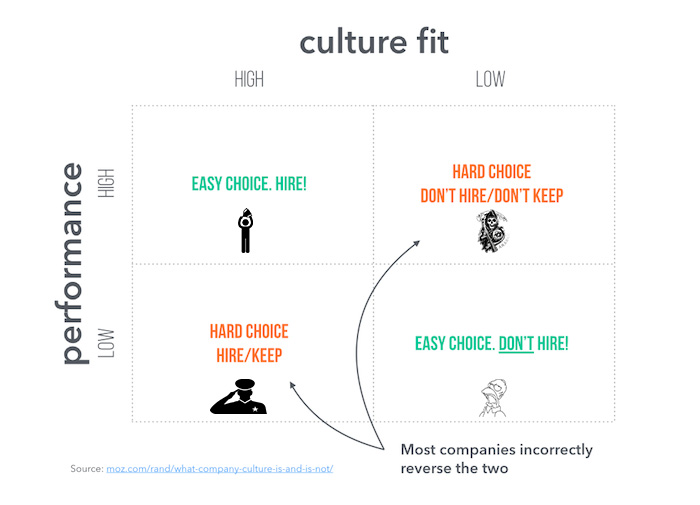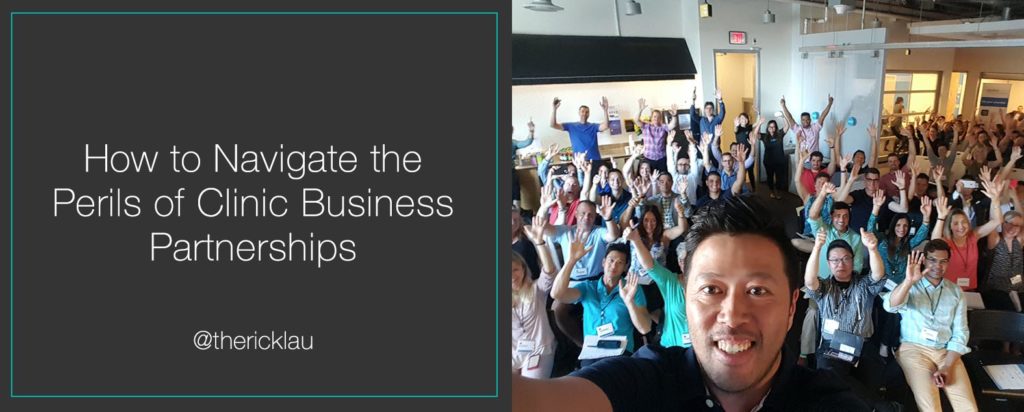Rick Lau, Healthcare Entrepreneur
I ran a clinic owner webinar recently where the topic was supposed to be about how to sell your clinic. Over 400 clinic owners signed up. What really surprised me though, once we started interacting, was that how to sell a clinic wasn’t the most pressing problem for my attendees.
Numerous owners were struggling much more with their business partners than with how to sell.
In my experience, there are seven main reasons why people decide to sell their clinics:
1) Health issue
2) Divorce
3) Business partner fallout
4) Losing superstar clinician
5) Spouse relocation
6) Burnout (it’s easier to just be a clinician for another owner)
7) Got an insulting offer
Losing a business partner isn’t so different from a divorce, and since #3 was such a pressing need in my webinar, I want to give you some insights about what to look for and what to avoid if you’re considering a potential business partner.
If you’re thinking about partnering with someone in a future clinic business, or if you already have a partner and are worried about how to end it, read this before taking another step. Or go to Accelerate LIVE 2019.
A Business Partner Compounds the Risks of Clinic Ownership
Even without a business partner, owning a clinic already carries enough risk.
You risk some money up front to get it started or to buy someone else’s clinic. You may need bank loans, often secured by putting your very house on the line. You have to spend millions on malpractice insurance.
You also make sacrifices in your life. It might mean 70+ hour workweeks. Less time with family and friends. Some hardship on your marriage.
And, since you’re running the show, you don’t have a guaranteed pension or retirement plan. You can’t complain about your boss or go on strike, because you’re the boss! And no one cares about the security of the person on top. Owners are all rich, right? Right… The reality is, it’s all on you.
That’s a lot of risk. And to be clear – it’s worth it. That’s why we do it, right? As my friend Paul discusses in this webinar, the reward is worth the risk because you get to make your own choices, build your own team, and decide your own priorities. If you want to go to your kids’ soccer game, you can go, and no one can order you to come in to work.
But when you add in a business partner, you are multiplying all that risk by a factor of two. Everything is compounded. Someone else now has money (or some kind of investment) on the line. Someone else is giving up their time, risking their relationships, giving up their assured benefits.
Entering into a business partnership is, again, very much like a marriage. It is not something to do lightly. Separating is expensive, when not done amicably.
Here are a few key issues you must address before entering into any business partnerships with regard to your clinic.
1.) Know Why You Want a Business Partner
If you think you need a partner because you need the money, that’s a terrible reason to look for a business partner. Successful partnership depends on having a shared vision, a passion for the business, and a commitment to do whatever it takes to succeed.
Without those elements, the temporary value of benefitting from a partner’s money will get swallowed up in conflicts over direction, goals, how to run the business, the color of the logo, and just about every other detail you’ll need to decide.
As this Entrepreneur article points out, most people don’t enter into business partnerships for good reasons. Many of them do it from a lack of confidence. If you lack confidence in your ability to pull this off, you have two choices:
- Don’t start your clinic. Just go work for someone else
- Go learn what you need to learn until you gain the confidence you need
Do not seek a business partner, hoping they’ll come to your rescue. You will likely regret that choice for the rest of your career.
2.) Do Our Core Values Align?
The most important things to me in a business partner are loyalty and trust. If your clinic grows, your business relationship will have to grow with it. It will get complicated. If your clinic struggles to grow, your business relationship will struggle with it. It will get complicated.
No matter what happens, it will get complicated. The only way to work through complications (just like in a marriage) is if both sides trust each other and are committed to the partnership.
Here’s a helpful diagram for thinking about core values and culture, as opposed to working hard and delivering strong performance:

As you can see, a high performance with a low culture fit eventually fails. You don’t have a shared vision. So you’re both working really hard, but you’re doing it for different reasons. Without a shared vision, with goals you both agree on, your hard work will eventually lead to division.
Resentment can creep in. Talking behind their back. Frustration. Two people can’t pilot a ship at the same time unless they agree on the heading.
Culture fit is more important than performance. You can train someone up from low performance. You cannot train someone out of a conflicting vision or a differing approach to business. This is true of business partners as well as employees.
For instance, I believe it’s our duty as clinic owners to impact as many people as possible. We should not feel guilty about selling a service that changes people’s lives for the better. For me, that’s a core value. That belief will affect how I run my clinics. And I won’t partner with someone who doesn’t share it. See more on this in my Instagram post.
3.) Clarify and Agree on Expectations
Doesn’t this sound more and more like marriage? Who’s doing the dishes? Who’s going shopping this week? If you don’t agree in advance, you have conflict.
With a business partner, you need to agree on some big decisions, such as:
- Who is putting up the money, and how much?
- How many hours per week are we expecting to work?
- Who is responsible for which aspects of business – marketing, hiring, operations, call tracking metrics training…
- What happens if….?
Too often, one business partner feels cheated because they perceive that they’re doing far more of the work, but they still have to split the profits 50/50. This is one way resentment creeps in. A negative perception leads to doubt and mistrust, and when things go wrong – blame.
When life changes, such as one partner having kids while the other is still single, the details of your partnership may also have to change. You should think about all this in advance.
And a 50/50 partnership is not the only way for it to be “fair.” If one person is putting up all the money, they probably should have a greater ownership stake. I’ve had partners where they owned 30% of the business because I put up all the money, as well as mentoring them on running the business.
They wouldn’t make it without me, and they know it, and this is agreed upon from the start. As long as these sorts of issues are clear and agreed upon from the beginning, you can make a business partnership work. But you have to think far ahead about what could happen, before it happens, and agree on how you’ll work through those things.
4.) How to Qualify a Business Partner
Bedros Keuilian wrote a superb article about what to look for in a business partner.
He identifies several critical traits you cannot compromise on. The risks are too great if these things aren’t observable and agreed upon.
First, it helps if each person has skills that complement the other person’s skills. Maybe you’re really good at marketing, but have less experience or confidence in hiring. One person might know more about purchasing equipment and supplies, and the other has more experience treating patients.
Or, you might both have successful experience in almost everything, and you can just divvy up the tasks.
Either way, you can see why tasks and duties must be agreed upon in advance. Find your strengths, identify your passions, for you and your partner, and then focus on those aspects of the clinic.
Second, Keuilian says both partners must be willing to work as if they own 100% of the business. It doesn’t matter what the actual percentages are. You are owners. So you should act like it. You’re not doing half the work. You’re doing all the work you can in the areas you’re focusing on.
Together, you can do more if you both devote all your energy to your clinic business.
5.) Create a Partnership / Shareholder Agreement
This is not a document you throw together in 30 minutes.
Remember, this is like a marriage. It might last for 20, 30, 40 years. Or, it might crash and burn in 8. Your partnership agreement assures both parties of how this agreement works, who does what, how it ends, and much more. Here are the critical parts of your partnership agreement, some of which come from this article:
- Who brings what to the table – money, services, experience/skills, marketing assets
- Who appoints directors, and what is the process
- How are decisions made (this is a big one)
- What information each person should expect, in terms of things like monthly reports
- When dividends will be paid, and at what percentages
- How one partner can sell or transfer their share of ownership
- Exit strategy – how you end the relationship
- Default – what happens if one person can’t continue for some reason
- How to work through deadlocks and disputes, and what happens if you can’t
- What happens if one person fails to uphold their part
- Most important: How you will calculate the value of the business if and when the partnership ends. Will your value be based on the last year’s profit, some multiple of that? Projected value based on the last five years? This conversation must be had up front, when you’re still friends.
And to be clear – none of what you’re reading here counts as formal financial or legal advice. Talk to your accountant and your lawyer before drawing up any kind of formal agreement.
6.) Why This Matters – A Personal Story
I’ve seen what happens when these kinds of conversations don’t take place early in a business. My own parents came to Canada and started their restaurant business. I grew up watching them run it, and saw them face the many decisions business owners face.
Their one big mistake didn’t become apparent until they wanted to sell it and retire. They couldn’t get a buyer because the business was too owner-dependent so they had to shut it down.
Setting up a business that isn’t dependent on the owner is a major challenge, and it’s yet another area that both business partners must agree on as a goal. That goal will necessitate a series of decisions and actions that will take work and commitment. You must agree on that before partnering with anyone.
For me, I’ve built up three $10 million healthcare business over the past 15 years, including a network of clinics with over 1400 employees. I’ve become one of the most sought after mentors for clinic owners in Canada and the US, where I’ve helped owners double, triple, and even quadruple their revenue while having more freedom than they thought possible.
I host the largest clinic owner business summit in Canada, Accelerate LIVE 2019.
We’re expecting a hungry crowd of over 250 clinic owners who want to learn everything they can about growing their clinics, including business partnerships. I’ll be presenting alongside 19 other real clinic owners, all of whom have built 7-figure clinic businesses.
>>Reserve Your Ticket Here Before They Sell Out Like Last Time<<
7.) Old Way vs New Way
Your independence as a clinic owner is under threat from many sides. Consolidation of healthcare, million dollar marketing budgets, full time recruiters poaching your best staff, insurance companies directing how care looks, and so much more.
Accelerate Insiders WIN in spite of all this coming against them.
As you continue delivering healthy outcomes to more patients, you’ll keep making more profits and will preserve the business you’re building, and be able to one day sell it on your terms.
That’s what you’ll learn about at Accelerate LIVE 2019. How to stop running your clinic the Old Way, and instead maximize your value and profits with the New Way.
>>Reserve Your Ticket Here Before The Prices Double<<
ABOUT RICK LAU

Rick Lau has built three 10 million dollar healthcare businesses over the past 15 years including a network of 127 clinics with over 1400 employees. He is one of the most sought-after mentors for clinic owners in Canada and USA where he helps owners double, triple, and even quadruple their revenue while having more freedom than they ever thought possible.
Rick also hosts the largest clinic owner business summit in Canada, ACCELERATE LIVE 2019. Sold out early to a hungry crowd of 300+clinic owners, Rick delivered cutting-edge keynote speeches alongside 19 other 7-figure health business owners.





